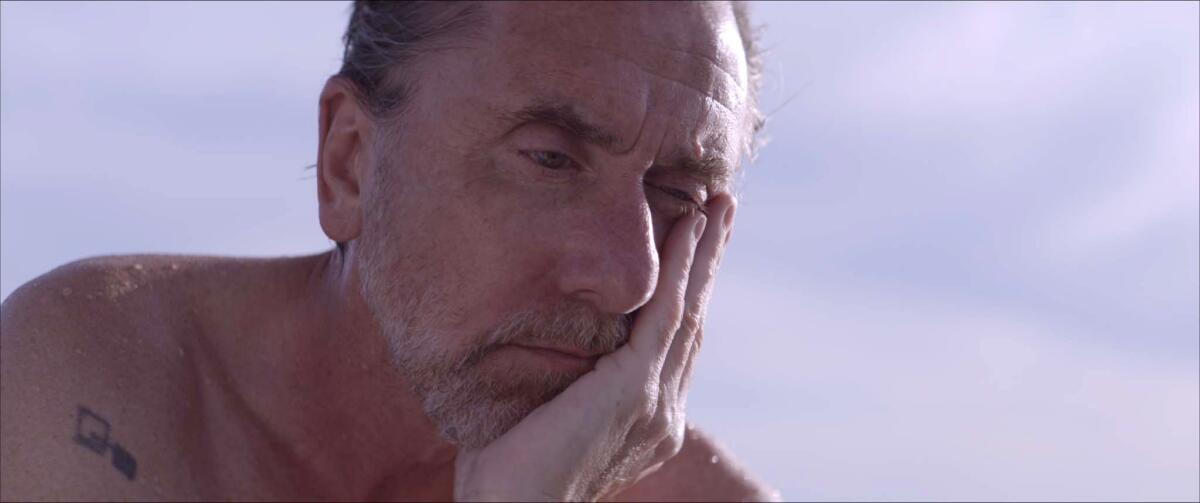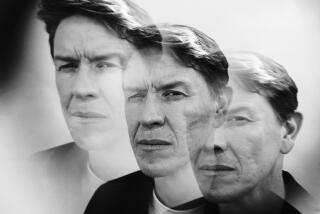Review: Tim Roth excels at quiet intensity in Michel Franco’s unsettling drama ‘Sundown’

The Times is committed to reviewing theatrical film releases during the COVID-19 pandemic. Because moviegoing carries risks during this time, we remind readers to follow health and safety guidelines as outlined by the Centers for Disease Control and Prevention and local health officials.
There’s a cryptic chill in the hot restfulness of Michel Franco’s Acapulco-set “Sundown,” in which Tim Roth plays a wealthy, aloof vacationer named Neil Bennett. It’s another stark, elliptical meditation on extreme detachment from a Mexican filmmaker whose coiled, sometimes violent dramas about upper-class family dysfunction (“After Lucia,” “New Order”) have earned him comparisons with provocateurs like Michael Haneke.
From the opening shot of caught fish gasping their last breath in the tropical heat, followed by Roth on a boat in a trancelike stare while a young man and woman (Samuel Bottomley, Albertine Kotting McMillan) frolic in the ocean before him, we can sense there’s an unspoken dissatisfaction beneath the lazy smiles of the Bennett family’s luxury vacation. Then Alice Bennett (Charlotte Gainsbourg) — whose brittle demeanor suggests somebody who struggles to relax — gets a distressing phone call from home, and the foursome’s trip is abruptly ended.
When Neil declares at the airport that he’s left his passport behind, however, he insists the other three go back to England without him and that he’ll catch the next flight. But instead of going back to their swanky resort, he tells his hustling taxi driver Jorge (Jesús Godínez) to take him to any hotel, where he checks into a bare-bones room, and a glimpse inside his bag reveals his passport. He then ambles over to a buzzy public beach, parks himself in a plastic chair facing the water and drinks beers and eats seafood while the surf, sun and the sounds of beachgoers lap at his consciousness. It becomes a daily ritual, and after a while, he stops taking the increasingly concerned phone calls from Alice, until she takes drastic measures to get Neil involved in their lives again.
It’s risky to put so emotionally disengaged a character at the center of a suspense film, but Roth is no ordinary actor, effortlessly bringing a mysterious heft to what looks like someone avoiding something but also giving in to something. Roth’s always been equally powerful with inexpressive roles as the showier, volatile ones, and this being his second quietly intense portrayal for Franco — the first being 2015’s “Chronic,” in which he played a dedicated, depressed nurse — indicates a distinct, fertile director-actor bond one hopes will continue.
Franco’s tightly controlled, vaguely sinister scenario — not unlike something Muriel Spark or Georges Simenon might have conjured up — doles information out gradually, allowing us to assume at first the kind of strained relationship Alice and Neil have, when in reality it’s something else. (Gainsbourg’s concise portrait of intimate frustration, like streaks of color on a blank slate, is marvelously effective.)
We’re also led to believe there’s something possibly unseemly in Neil’s taking up with a beautiful local kiosk worker named Berenice (Iazua Larios), but their fling is also cozily amorous in a way that seems to bring a measure of peace and pleasure to them both. That it nevertheless feels impermanent is part of the subtle unease Franco achieves, helped by the watchful but reserved, and at times sly, framing of Yves Cape’s camerawork.
Getting a read on Neil’s melancholic impassivity becomes especially tension-filled when Franco introduces a couple of shocking, violent incidents that juice “Sundown” beyond its protagonist’s initial deception, disrupting the initial depiction of sun-baked Acapulco as an escape and nudging the already simmering theme of mortality to the forefront. Neil’s languid estrangement from matters of family importance is one prism through which to view these turns, but perhaps the more revealing is his curious indifference in general to twists of fate, or how people might react to his there-not-there behavior.
In one sense, “Sundown” is a bleak window into the corrosive effect wealth and privilege have on relationships and the psyche, and even with a final reveal that fills in some of why Neil is the way he is, it still doesn’t feel that explanatory. Which isn’t necessarily a bad thing for this taut, confidently unsettling film.
'Sundown'
Rated: R, for sexual content, violence, language and some graphic nudity
Running time: 1 hour, 23 minutes
Playing: Starts Jan. 28, Alamo Drafthouse, downtown Los Angeles; The Landmark, West Los Angeles; AMC Sunset 5, West Hollywood
More to Read
Only good movies
Get the Indie Focus newsletter, Mark Olsen's weekly guide to the world of cinema.
You may occasionally receive promotional content from the Los Angeles Times.










